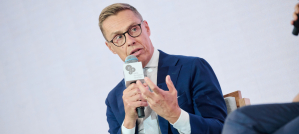The Chocolate King Comes to Chocolate City
Ukrainian President Petro Poroshenko is coming to Washington Thursday, seeking support and financial backing in his ongoing battle with Russia over whether his country's political and economic future lies with Moscow or the rest of Europe.
A year ago, Poroshenko, known as the "chocolate king" because of his Roshen candy company, thumbed his nose at Moscow, faulting Russia's strong-arm tactics for pushing Ukrainians toward the European Union. Today, he hopes the United States will bolster his former Soviet republic against those same bullying tactics, which have pushed him to compromise both on territory and his Westward aims as Russia's willingness to fight for Ukraine has proved stronger than Europe's.
Poroshenko is set to meet President Barack Obama at the White House and address a joint session of Congress Thursday. But what he'll leave with -- in terms of greater financial or military support -- is still unclear.
The Senate is preparing far-reaching legislation that would double down on the energy and defense sanctions that the Obama administration announced earlier this month, including special provisions targeting Gazprom -- Russia's state-owned energy giant -- and its ability to interfere with Europe's gas supplies.
The bill, slated for a vote in the Senate Foreign Relations Committee after Poroshenko speaks, would also give the Obama administration authority to send arms to Ukraine. The House also passed a resolution Wednesday on Ukraine's right to defend itself. But the legislation may not garner enough support to pass. Lawmakers are juggling a number of emergency measures as a Sept. 30 deadline to pass a spending bill to avert a government shutdown looms.
On Wednesday evening, the House passed a measure, known as a continuing resolution, to fund the government through Dec. 11. The Senate is expected to take up the spending bill Thursday.
So far, the United States has made sanctions its main response to Russia's efforts to destabilize eastern Ukraine and its March annexation of Crimea. The United States and the European Union have targeted companies in Russia's finance and energy sectors as well as businessmen and politicians close to Russian President Vladimir Putin. Neither approach has caused him to pull back his support of separatists in eastern Ukraine.
The United States and Europe have also offered Ukraine modest financial support, but Kyiv's kitty is rapidly emptying. Ukraine's budget situation has deteriorated quickly, as the government was forced to divert more and more resources to the military over the summer. The International Monetary Fund agreed in March to give the country a $17 billion loan, released in tranches, combined with some $10 billion more promised in bilateral aid from individual countries. But the fund warned earlier this month that Ukraine may need a new bailout: "Risks loom large," the IMF said in its Sept. 2 report. In March, the U.S. promised to back $1 billion of Ukrainian debt to make it easier for Ukraine to raise money in public markets but the IMF said Ukraine could need as much as $19 billion more.
Robert Kahn, a senior fellow at the Council on Foreign Relations, said Ukraine's allies will likely wait to send Kyiv more money, even though it's clear the country will need it as it struggles through IMF-mandated economic reforms.
"The tendency in the West is not to do anything unless they're absolutely forced to," Kahn said.
In the face of Russia's greater military strength and continued trade threats, Poroshenko compromised this week both on territory and an EU agreement. Ukrainian lawmakers passed laws Tuesday giving greater autonomy to eastern territories held by pro-Russian rebels, further solidifying a cease-fire agreement that freezes military gains made by separatists.
At the same time, the Ukrainian Parliament took a long-sought step toward the West by passing an agreement that strengthens political and economic ties between Kyiv and the EU bloc. But, in a notable concession to Moscow, Kyiv delayed some of the trade provisions of the agreement until 2016. Ukrainian companies can still export to the EU without paying higher tariffs, but the political implications of the delay -- that Russia can slow Ukraine's progress toward Europe -- are more important than its economic implications.
"In determining Ukraine's geopolitical orientation, the precedent has now been set for consultation with Moscow -- in this way Ukraine's own sovereignty and right to self-determination has been further eroded," Timothy Ash, head of emerging-markets research at Standard Bank, said Wednesday in an emailed analyst's note. "Through this action -- presumably driven by EU powers -- the EU has finally revealed its real lack of commitment to Ukraine."
Western diplomatic sources said the EU didn't pressure Poroshenko into delaying the agreement.
The stakes are high for Poroshenko. Then-President Viktor Yanukovych's decision not to sign the EU agreement last fall prompted demonstrators to flood the streets of Kyiv, ultimately tossing him out.
Last September, Poroshenko was at the Yalta European Strategy meeting in Crimea, where the question of Ukraine's future dominated the agenda. Sergei Glazyev, a Kremlin economic advisor, warned that signing the EU agreement would be a "suicidal" step for Ukraine. Poroshenko said Moscow's bullying -- including banning his chocolates from the Russian market -- were responsible for pushing Ukraine into Europe's arms.
"For the first time in our history more than 50 percent of people support European integration and less than 30 percent of people support close ties with Russia. Thank you very much for that, Mr. Glazyev," he said, according to the Economist.
The same meeting was held in Kyiv last weekend, instead of the now-Russian Crimea. Russian Defense Minister Sergei Shoigu said Tuesday he was sending more troops to Crimea, in response to NATO forces conducting exercises in Ukraine.
Jamila Trindle
foreignpolicy.com



 Меню розділу
Меню розділу